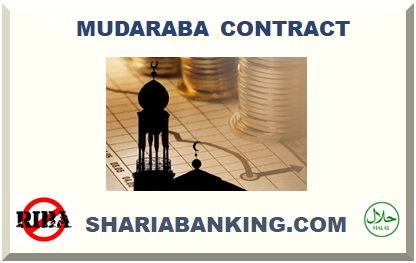
MUDARABA CONTRACT 2024
MUDARABA PRINCIPLES AND HOW IT WORKS AS ISLAMIC FINANCE PRODUCT
Mudaraba contract is by definition a financial partnership in Islamic finance where one party provides the capital (Rab-ul-Maal) and the other party (Mudarib) contributes expertise and management to the venture, aiming to generate a profit which is then shared between them according to predetermined ratios.
Mudaraba contract is rooted in Islamic principles that prohibit interest (Riba) and emphasize ethical investments, allowing investors to contribute financially to a venture without having to participate in its day-to-day management.
Mudaraba agreement inlcudes that the profit-sharing ratio between the investor and the manager must be agreed upon at the outset of the contract, ensuring clarity and fairness in the distribution of profits derived from the joint venture.
In the event of a loss, unless negligence or violation of terms is proven, the financial loss is borne solely by the investor, protecting the manager from financial liability provided they have performed their duties diligently.
Mudaraba contracts are versatile and can be utilized for various projects and business ventures, ranging from small enterprises to large-scale investments, making it a popular choice for Islamic project financing.
The Mudarib's role is to utilize their expertise to manage the project effectively, making strategic decisions to ensure the venture's success and, consequently, the profitability of both the Mudarib and the Rab-ul-Maal.
Due to its ethical foundation, a Mudaraba contract ensures that all investments are made in Sharia-compliant ventures, excluding businesses involved in prohibited activities such as gambling, alcohol, and usury.
Mudaraba contract is considered a critical component of Islamic finance, promoting risk sharing, entrepreneurship, and the ethical use of capital, contributing significantly to the economic empowerment of individuals and communities by aligning financial activities with Islamic values.
What types of Mudaraba contract are available with description?
-
Restricted Mudaraba (Al-Mudaraba Al-Muqayyadah)
In a Restricted Mudaraba contract, the Rab-ul-Maal (capital provider) specifies certain conditions for the investment, such as the type of business, geographic location, or duration. This allows the investor to have some control over the use of their funds, while the Mudarib (entrepreneur or manager) must adhere to these restrictions when managing the investment.
-
Unrestricted Mudaraba (Al-Mudaraba Al-Mutlaqah)
An Unrestricted Mudaraba contract gives the Mudarib full discretion to undertake any business venture they deem suitable without needing to adhere to specific conditions set by the Rab-ul-Maal. This type allows for greater flexibility in the investment's management and is based on trust and the Mudarib's expertise in selecting and executing business ventures.
-
Permanent Mudaraba
Permanent Mudaraba contracts are long-term agreements without a specified end date, allowing for ongoing investment projects. These contracts continue until either party decides to terminate the agreement, providing a stable and continuous investment opportunity for both the Rab-ul-Maal and the Mudarib.
-
Temporary Mudaraba
Temporary Mudaraba contracts are established for a specified duration or for a specific project. Upon completion of the project or expiration of the term, the contract ends, and profits are distributed according to the agreed ratio. This type is suitable for short-term investments or projects with a defined timeline.
-
Single Mudaraba
In a Single Mudaraba contract, one Rab-ul-Maal provides the capital for the Mudarib to manage in a business venture. This straightforward arrangement involves a direct partnership between two parties, focusing on a specific investment or project.
-
Multiple Mudaraba
Multiple Mudaraba contracts involve several investors (Rab-ul-Maal) pooling their resources to fund a larger scale project managed by a Mudarib. This type allows for the sharing of risks and rewards among a broader base of investors, often leading to larger and potentially more profitable ventures.
HALAL MORTGAGE TAKAFUL INSURANCE STUDENT INSURANCE CAR INSURANCE ICELAND HOME INSURANCE REAL ESTATE INSURANCE LIFE INSURANCE BUSINESS INSURANCE TRAVEL INSURANCE HAJJ UMRAH INSURANCE FUNERAL INSURANCE MOSQUE INSURANCE AUSTRALIA INSURANCE GERMANY INSURANCE ISLAMIC CAR LOAN ISLAMIC MICROFINANCE WITHOUT INTEREST BUSINESS LOAN FOR WOMEN TAKAFUL MORTGAGE LOAN WITH POOR CREDIT ISLAMIC DEBT CONSOLIDATION DISABILITY LOAN STUDENT LOAN ISLAMIC LEASING LETTER OF CREDIT PERSONAL LOAN FOR STARTUP PRIVATE LOAN CROWDFUNDING CALCULATOR FOR WEDDING FOR EXPATRIATE ISLAMIC INSURANCE INDIA TAKAFUL ISLAMIC HEALTH INSURANCE USA TAKAFUL CANADA TAKAFUL UK TAKAFUL FARMER LOAN TAXI LOAN RAMADAN LOAN LIST OF ISLAMIC BANKS ALBANIA ALGERIA AUSTRALIA ISLAMIC COLLEGE SCHOLARSHIP BAHRAIN BANGLADESH BOSNIA-HERZEGOVINA BRUNEI CANADA CHINA DENMARK DJIBOUTI EGYPT ETHIOPA FRANCE INDONESIA IRAN IRAQ IVORY COAST JORDAN KAZAKHSTAN KENYA KUWAIT KYRGYZSTAN LEBANON LIBYA LUXEMBOURG MALAYSIA MALI MAURITANIA MOROCCO NETHERLANDS NIGERIA NORWAY FINLAND ISRAEL HONG-KONG GHANA RWANDA GAMBIA SIERRA-LEONE SOMALIA MYANMAR ANGOLA MAURITIUS OMAN PAKISTAN PALESTINE PHILIPPINES QATAR RUSSIA SAUDI-ARABIA SENEGAL SINGAPORE SRI-LANKA SUDAN SWITZERLAND SYRIA TAJIKISTAN TANZANIA CYPRUS JAPAN ARGENTINA BRAZIL AUSTRIA SOUTH KOREA MALDIVES WAKALAH WADIAH AMANAH SUKUK ISLAMIC CREDIT CARD WAAD ISLAMIC HEDGING MUSAWAMA MURABAHA QARD-UL-HASAN BAI-SALAM ISTISNA MUDARABAH IJARA IJARAH-THUMMA-AL-BA IJARAH-WA-IQTINA IJARA-MAWSOOFA-BI-AL-DHIMMA TAWARRUQ MUSHARAKA BAI-MUAJJAL-BAI-BITHAMAN-AJIL BAI AL INAH HAWALA KAFALAS RAHN THAILAND TUNISIA TÜRKIYE U.A.E UNITED-KINGDOM U.S.A UZBEKISTAN YEMEN AZERBAIJAN INDIA BELGIUM GERMANY IRELAND ITALY NEW-ZEALAND SPAIN SWEDEN BULGARIA KOSOVO SOUTH-AFRICA LONDON